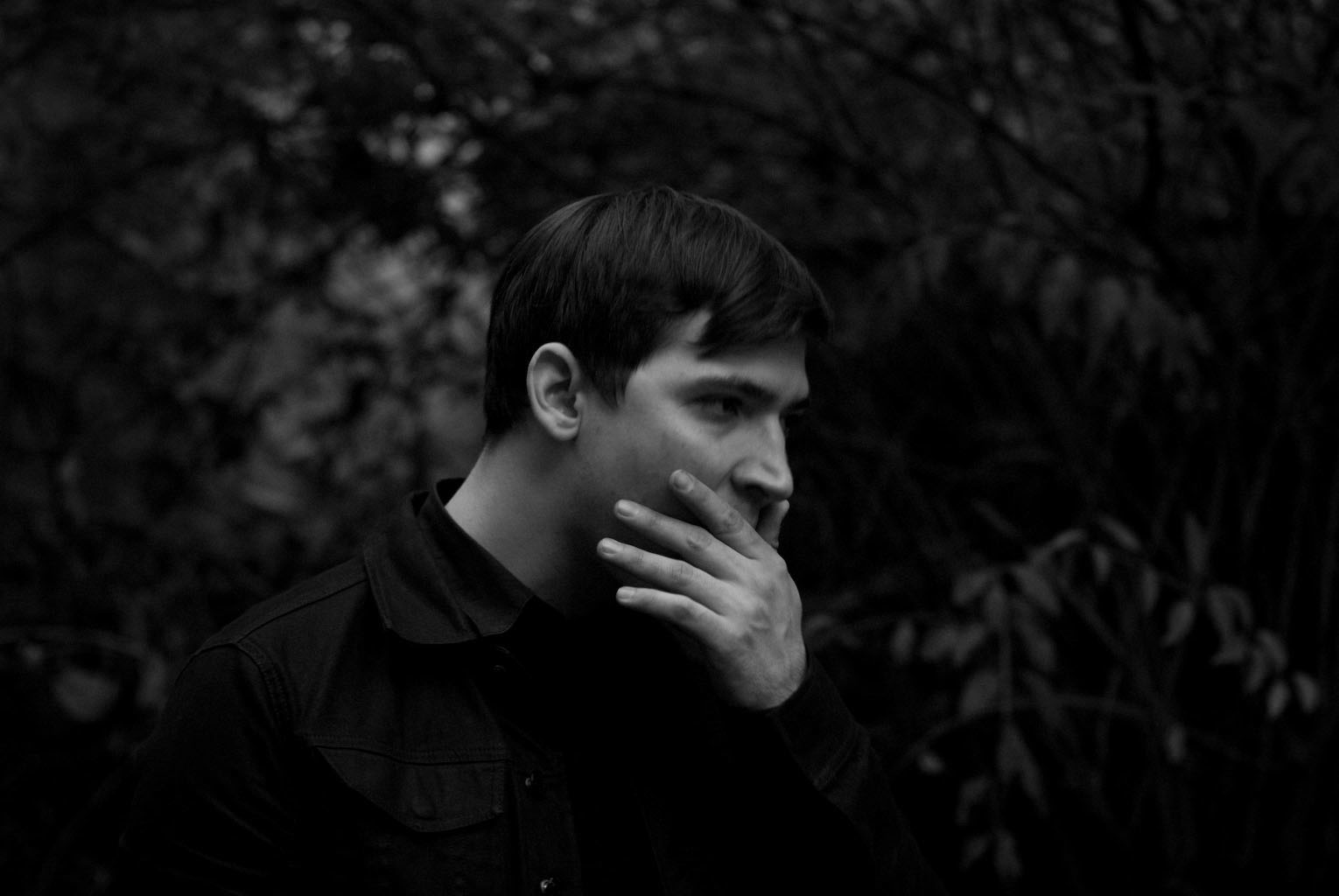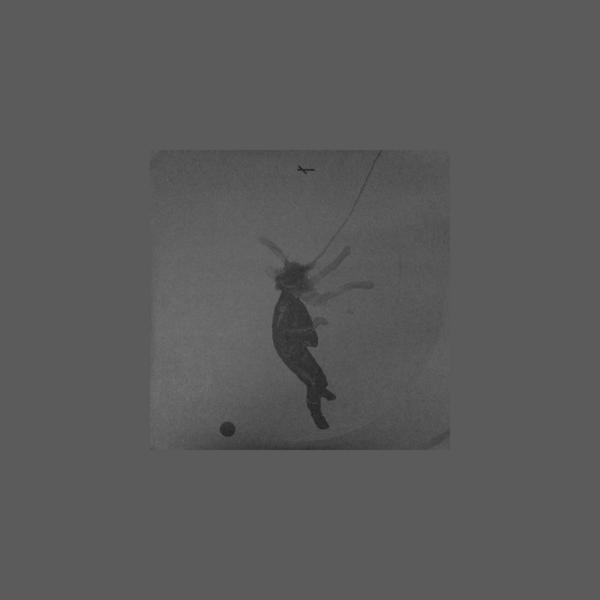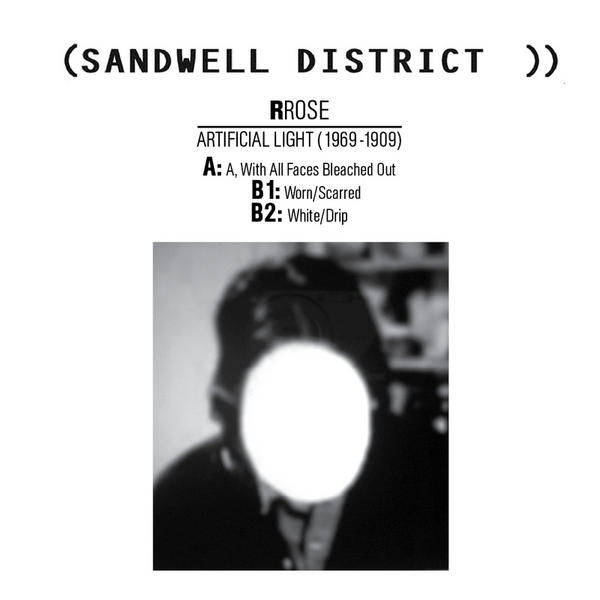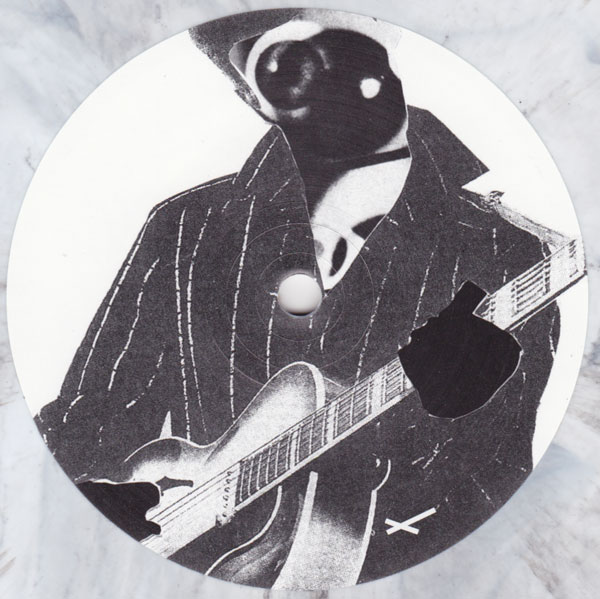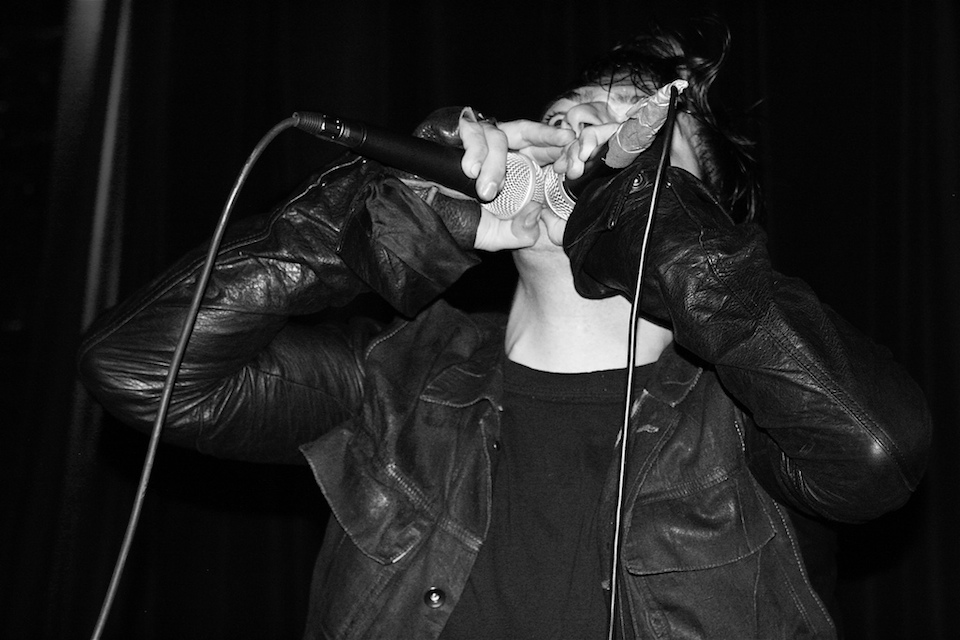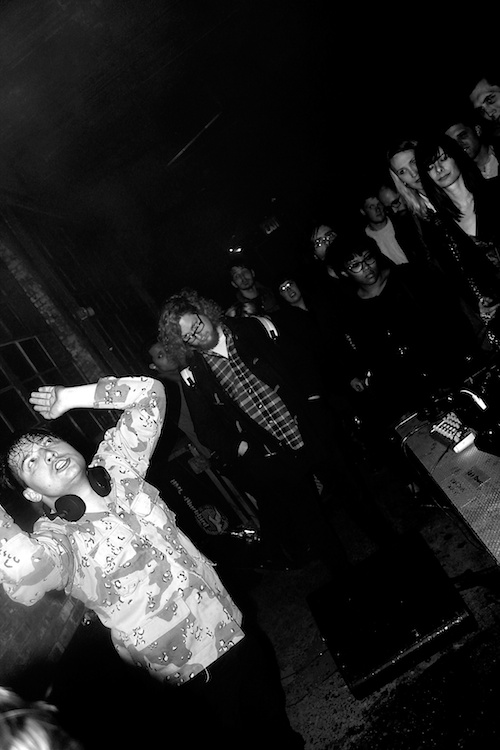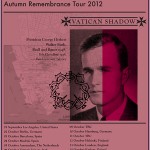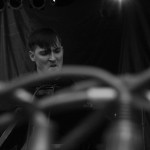Lead photo by Shawn Brackbill
Live photos and words by Andrew Parks
“I actually find Daft Punk to be incredibly dark in a non-obvious way,” says Dominick Fernow, the producer/performer behind the iconic noise label Hospital Productions and such shape-shifting aliases as Vatican Shadow, Prurient and Rainforest Spiritual Enslavement. “But that’s just me. I don’t know. Clubs are dark; dancing is dark. There’s something about raw and revealing and grotesque about the need to interact with people, and the need for sex.”
Fernow’s animalistic portrayal of Daft Punk and dancefloors themselves says a lot about how he views the world at large, about how he’s unable to ignore what lurks just beneath the surface in both popular and underground music. Another good example of this is the “’90s mix” he cut for us a couple years back. While it relies on alt-rock radio’s most familiar faces—Stone Temple Pilots, Nine Inch Nails, KoRn, even the Cranberries—its overriding subtext is much bleaker than any of the Top 40 hits they cranked out during the Clinton years.
“The ’90s was the last time that popular music was directly attached to and addressed darkness,” Fernow wrote us at the time. “It was also coincidentally the decade during which I grew up and was the first music I was exposed to. As a child I always felt that this music was in some sense morbid and existential, but I wasn’t aware enough and lacked a context for the subject matter. Later in life, my feelings were confirmed, when reading books about some of the men that created this work revealed stories of sex, death and, of course, heroin. The pre-Columbine era is also, some would say, the heaviest heroin age in America. The shootings triggered a cultural loss of innocence in America and rock died.”
If all of this confirms what you thought you already knew about him, let’s just say things aren’t that simple. In many ways, the past year has been the healthiest, and most hopeful, stretch of Fernow’s long career, as his experiments in EBM, industrial, ambient and techno music eclipsed his earlier explorations of ear-splitting noise frequencies and found a new audience that stretches all the way from Richie Hawtin’s moonlit rendition of Ibiza to a reputable dance spot like the one he’s playing tonight, Brooklyn’s scene-straddling Output Club. In the following exclusive, we try to make sense of it all, and point a light down the path of what may be next for one of the underground’s most elusive figures…
Hey man; how are you doing?
I’m alright. I have a sprained ankle.
And how did you manage to do that?
I did it onstage in Switzerland of all places. I was dancing around and I fell over a monitor. The worst part was it was 10 minutes into the set so I had to do the rest of it on one leg.
Were you still trying to jump around?
I had to fake it [laughs].
How was your trip to Europe?
It was incredible. It was probably the hardest, but also the best, thing I’ve ever done.
Just in terms of hitting so many cities?
Yeah, that kind of touring is such a different model. I was on almost 80 flights in five months, you know? It was physically exhausting in a different kind of way.
And you don’t like traveling right?
Exactly. I have multiple travel phobias and issues, but it’s actually helped me a lot with it. I have a total fear of flying, but I’ve been working through that the last couple of years. I’ve learned to manage it.
You’re not popping a Xanax every time you get on a plane are you?
No, it’s not a drug thing at all. It’s a combination of learning about aviation, breathing exercises and muscle tension exercises. What people don’t realize is it’s an irrational fear. It has nothing to do with the airplane; it’s all about these other anxiety issues that are exasperated by the plane.
Right. Like you’re in an enclosed space for a set period of time…
The lack of control is really at the root of it. And it’s a lack of trust.
It’s like trusting a total stranger to drive you across the country.
It’s a very complicated psychological issue. It’s not something that can be addressed literally because it’s not a rational problem.
Getting to play at legit clubs like Fabric must have put your music in perspective on this trip.
The last show on the tour was the Blackest Ever Black showcase in London. I did a Prurient set. It was an amazing experience because it was the first show in years that reminded me of the feeling I got from the early No Fun fests in terms of it being this strange, undefinable moment that makes sense at the same time. As absurd as it may sound, I played a “hits set” of Prurient albums dating back to Pleasure Ground. The shit’s almost 10 years old, and I’m looking out at the crowd and there’s club kids dancing to power electronics. It’s completely new because no one does anything in techno in terms of a live performance element. In fact, the “performance” is frowned upon to a degree because you’re breaking this supposed code between the DJ and the audience. Most of these people know me as Vatican [Shadow]; they don’t know me as Prurient, so it’s shocking in a way. It definitely felt like a special, rare moment. And I’m sure that moment will die soon but for the time being, it’s here.
People ask me all the time ‘why this noise techno thing’ or whatever. I don’t really think much has changed. There’s been tons of ‘industrial techno’ for years; what’s changed is the listeners and the way people are hearing it. Before the only place you’d hear it is in the clubs or through 12-inches predominantly. It was music created for a certain environment to serve a function. What’s changed is you know have home listeners who are coming forward and aren’t there to dance or do drugs necessarily. So the music hasn’t changed; labels like Ant-Zen have existed for almost 20 years. That’s their main thing and it’s been completely ignored.
Even with black metal, there’s all sorts of examples of people who have DJ’d or talked about techno and electronic music in their interviews. I reject this idea of newness. What’s new is the audience.
And it’s not just about noise techno either. A label like Blackest Ever Black has lots of other things going on.
I don’t see a need to divide all these subgenres. It’s all coming from electronics one way or another. People just haven’t been aware of these subcultures that have been going on for years. The imagery—the packaging and the presentation—has changed. I always liked techno and electronic music as a kid. In fact, I was into it way before I was into noise and metal. I just hated the aesthetic of it. Sandwell District changed that for a lot of people. Suddenly there was someone referencing punk and industrial. That was a really important moment.
Right. A lot of their records were packaged in an almost zine-y way, with xeroxed art and all that. Then as soon as they got some attention, they were like, we’re going to shutter the label now.
Which is genius in my opinion.
The last time I saw you play as Prurient, it was with Wes [Eisold]. What are your Prurient sets like now?
It starts with Pleasure Ground and Black Vase-era tracks, then it goes into the No Fun era and I’ll play “A Meal Can Be Made” from Bermuda Drain and end with “You Show Great Spirit.” So there’s a touch of the new stuff, and it’s done in an almost straight chronology that isn’t necessarily intentional.
Some moments must be particularly jarring then.
Yeah, and it’s funny because by the time I play “A Meal Can Be Made,” people go nuts. It’s interesting to see how that material generates the most violent reaction even though, sonically, it’s the most straightforward.
Well it’s your version of a punk song basically.
It’s totally a punk song. Exactly. Doing the Vatican stuff at Fabric and Ibiza is a totally different world. I’m just starting to realize now how poorly I’ve been doing this for so long. I think there was an attitude of ‘it’s experimental’, but in reality the intention was never to be experimental. It was just to make techno. That was all I could figure out to do, and all I knew how to do. There was nothing designed to provoke, alter or destroy this model. It was entirely accidental. But most of the best things are accidental.
What were the crowds like at Fabric and Ibiza?
Hawtin and his team have transformed the venue in Ibiza. They’re so good at creating the atmosphere, the identity and the design. It’s the perfect marriage of presentation and music. The branding is so heavy, and it’s so different from everything else on the island. Even just coloristically, and the typography is different. But the audience is still having fun. It’s genius; it’s having your cake and eating it too.
Is that a little disorienting as a performer? You don’t exactly look like you’re ‘having fun’ when you play.
I don’t know. I want people to dance. Dancing doesn’t necessarily have to be fun. It’s an energy, a fearlessness. So it’s coming more from that position. Fabric was completely insane. That was the best experience I’ve ever had at a show, ever.
How is that?
All of the elements were in place. It was the most abusive sound system I’ve ever experienced. When Regis played, I literally felt like the life was being choked out of me—like someone had their hands on my esophagus and every time the kick drum came in, they were squeezing the air out of me. I don’t know what he was doing. Russell Haswell was there at the time, and even he was looking at me with this agony. It was even pushing Russell’s limits, which is saying something. It was the most visceral sonic experience I’ve ever encountered, in noise, metal, anything.
Hearing this music on better systems makes such a difference. Another example is that Red Bull show that was essentially a noise showcase. It’s so much more visceral.
The greatest contribution noise has given to music sonically is frequency. You can have the best gear, but if you’re playing through headphones, there’s only so much you can do. It is a gift to hear these frequencies in their full life. With Fabric, it’s almost like the more rock ‘n’ roll the show is, the more they love it. By rock ‘n’ roll, I mean the stupider, like throwing beer on people and putting yourself in this physically awkward position. The audience really responds to that. It’s important to not take it too seriously. With the Vatican stuff, some people are disappointed because they’re expecting this dour, sad fuck sitting behind a computer. To me, it’s a celebratory atmosphere. That really works in a place like Fabric. It’s bringing these cliches from another world into electronic music. Again, I don’t think any of this is new. It’s all about re-contextualization as a performer. And then there’s the subject matter behind it—it’s dance music about death. That turns me on—seeing that tension. And not in an antagonistic way. The audience is there to move. It’s great. That, to me, is more extreme than any of the noise shows I’ve played in 10 years.
Prurient shows have always been very voyeuristic, as if you’re watching someone unravel. And these Vatican Shadow shows have been always the opposite, confrontational in their own way. How do you view the differences between the two?
It’s different because the subject matter requires a different kind of performance. The Prurient story is more personal. The voyeurism aspect allows you to enter it with a level of safety…I’m actually working on an essay that’ll redirect the discussion [about Vatican Shadow]. Speaking as a performer, there are visual cues, and I don’t want people to stand there, looking miserable. It’s designed to open you up. The fearlessness of it is important. To me, that’s not confrontational; it’s engaging. It’s inviting people to dance. When it works, it’s rewarding, because you feel like you’re finally able to get something across. In a way, I’ve gone across this completely backwards. It’s an uphill battle to change the perception I myself created. But the best art is full of holes. That’s what makes it human—that it’s imperfect, and even stupid.
What’s the perception that remains about your work then? That you’re this confrontational noise dude?
Yeah. I don’t think the result should become the definition in our music. So many artists are either lauded or hated in their time, and it can change a lot since then. So to me, that viewpoint is almost irrelevant. It’s always going to keep changing, but the intent is not.
Another word that’s often abused is “extreme”. It only begs the question of who it’s extreme to…I come from a time when music actually represented a lifestyle instead of downloads. I mean, I don’t get up every morning and think, ‘Man, I’m so fucking extreme.’ It’s just the same old shit everyone else is going through. The context is just different. I think that’s my failure as an artist—not being able to communicate these ideas. I can only do what feels truthful and natural to me. The intent is the only thing that won’t change.
You’ve been very prolific with your different projects over the past couple years, to the point where some of their sounds are bleeding into one another. Like the Prurient record on Blackest Ever Black could pass for a Vatican Shadow one. Are the concepts what separates all these projects?
Absolutely. I never start with music. Sound is always the last part of the project. I’m inspired by words and images, primarily by reading. And that’s not to say that the sound of the music is not important. It’s just not what inspires or motivates me. The power noise once had is it was never about music. It was never about noise. It always took an inspiration from somewhere else. You had something that’s essentially abstract and yet, had so much of a presence. If sound and images are too abstract, I lose interest. And if they’re too direct, I lose interest. There has to be a non sequitur in this.
When I was growing up, independent music was about everything around it. It was a platform for all these other discussions that were visual, that were lyrical, that were conceptual, that were personal, that were local. That’s the tradition I’m following in. The subject is what creates or ends a project. In the case of the Blackest Ever Black thing, that record is two years old. Hydra Head was supposed to put it out, but the label folded and by the time it came out, it was too late. Yes, it sounds like Vatican, but it’s more like Vatican sounds like it. Those records were the transition of learning to make techno.
Are you working on any Prurient material now?
There’s a new album that’s very, very slowly being worked on. It’s too soon to say anything about but I’ve been working with a new creative partner, and it’s been a great process so far. It’s too early to say what it’ll be. There’s little pieces of it in the live set.
Is your creative partner Silent Servant?
No [laughs].
Is it someone from that world?
No, it’s completely divorced from that world.

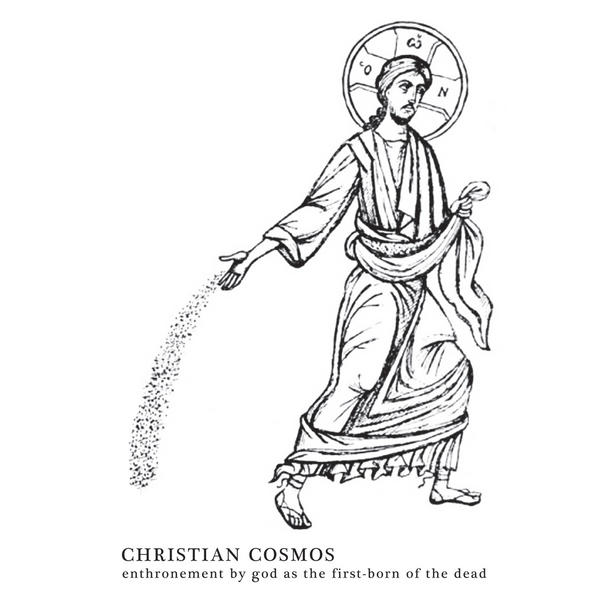
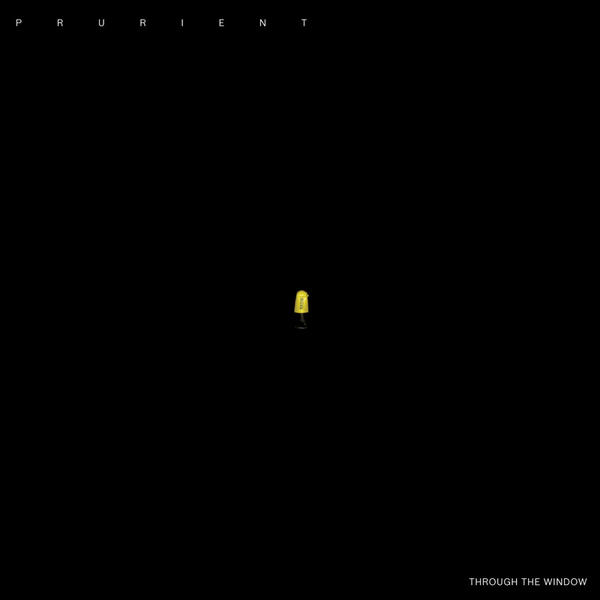
One thing you haven’t talked much about is your Rainforest Spiritual Enslavement project. It it almost an extension of the last Prurient record in terms of how it’s about traveling?
Not really. Something that’s ridiculous is this idea of anonymity. It was created entirely by other people who weren’t reading the description of the Christian Cosmos album that came out, which said Christian Cosmos, Rainforest and Vatican are all my projects. And they’re all dealing with fear and anxiety in different environments. They’re intentionally connected through the use of electronics, rhythm and subject matter. Rainforest is natural and superstition based, Vatican is technology and earthly issues, and Christian Cosmos is religious and esoteric. So, yes, they do sound similar, but that’s the point. It’s a way of exploring one topic through different voices. Another way of putting it is man, nature and god, or father, son, holy ghost.
Is the superstition part of that coming directly from you, or from witnessing others?
It’s primarily about Papa New Guinea and witchcraft, which also has this strange relationship with true crime. There’s an enormous amount of murders happening, involving people who are suspected to be witches. There’s this insane crisis happening where police literally don’t have the resources to investigate the murders. And by that, I mean, they don’t even have gas money to go into the jungle. So, yes, I am a person who’s suffered form anxiety disorders my entire life, but it’s more an exploration of fear in general. These beliefs, or these lack of beliefs, is what generates this fear and anxiety. All fear comes from control, or the perception of a lack of control. It’s personal in the sense that it’s an attempt to explore and understand these disorders but it’s using all of these other stories. I think it’s important to draw the distinction between the intent and the outcome. To an extent, everything I do is personal but using these other stories is a way to let other people in more. That’s what I’ve learned with Prurient—that there’s a limit in terms of how far people will go into your story.
I get demos all the time, and I wish someone would send me an insane demo with a crazy concept and a visual identity from the go, but it isn’t happening. So a lot of my process is trying to create what I’m looking for.
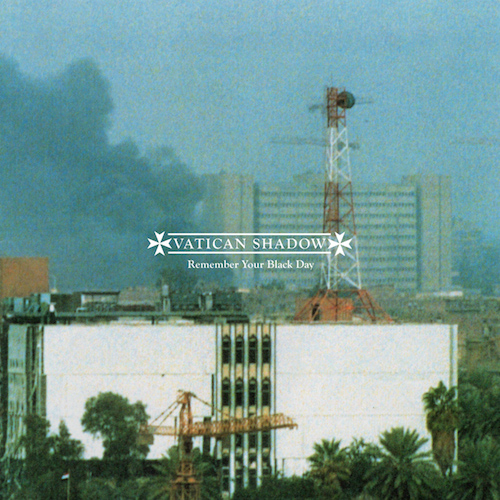
You’ve called your new record the first official Vatican Shadow album. Which makes sense in a way, as it covers a lot of ground stylistically, making it clear that it’s much more than a militaristic techno thing. When I first put it on, it was like I was listening to an old Aphex Twin record.
Well, to other people, I’ve released all these other albums. But to me, they weren’t albums. The intent wasn’t there. They were pieces, they were EPs, they were experiments. It’s a semantic issue, and I think it’s an ongoing, interesting discussion in music of what makes an album. Some people just think it’s length, but to me, it’s more complicated. That’s why I’ve always loved 7-inches. The albums are the ‘big statements’, but those are less organized in a way because they have to address all aspects of the project. EPs are where you can obsess over something, and the album is supposedly the results of your research.
So this record is your mission statement in a way?
Yeah, but it’s also about the imagery. I’ve been sitting on those images for a while, waiting. The EP that’s following it, When You Were Crawling, it’s really important in terms of the design and the imagery. That really completes the album.
You must feel like you’re in a weird position right now, because you seem to have this new audience that picks up all of your projects and may have not be as familiar with Prurient.
Yes and no. You have to understand I started doing this when I was sixteen, in ’97. When you’ve been doing something for 15 years, there’s peaks and valleys. Don’t get me wrong; I don’t have any illusions about my place in this. But it’s just business as usual.
I wanted to end by asking you about Muslimgauze, since that’s been one of the biggest influences on the work you’re making now. If someone’s into Vatican Shadow, what should they check out by him?
Well there’s the classics—Veiled Sisters, the Betrayal album, Drug Sherpa, Dome of the Rock.
Why have you connected with his work so much?
Well, Jesus Christ man. Everything that is happening in electronic music now he already did 20 years ago, flawlessly, without any scene or guidance. He was doing it all by hand—this whole mix of ambient, field recordings, breakbeats, techno, dub, sound collage, concrete music, industrial, he’s literally done it better than anyone has since. And then there’s the mystery of it. Everything about him is so mysterious—he’s willingness to perform so many works, and just the fact that he’s dead. It’s so ahead of time, especially in this subject matter. It was rogue then; now it’s defined our world for over a decade, and it appears to keep going on in that direction. It’s so ahead of it’s time, and so unique, so him. Even though it references all this music, it’s all centered around one man.
What were some of your earliest reference points for electronic music?
When I was growing up and listening to the techno at the time, most of the stuff I got was tapes. DJs made mixtapes and there were stores that had hundreds of them. One in particular, this guy from Madison named DJ Anonymous, he did these two mixtapes that were two jewel cases taped together. One side was an S&M picture of a woman, and the other side was an S&M picture of a man. And one tape was jungle, and the other tape was gabber. That really had a lasting impression on me.
Just the way it was presented?
Yeah, the rawness, and the duality of it. Also the idea that you didn’t have to DJ one style of music. I guess my point is that techno has always been on tape. And on vinyl, of course. That’s something I find really disturbing—the tape movement that’s happening now, with manufacturing. I think labels doing cassette versions of albums that are shrink-wrapped and all that, that’s not tape culture to me. The whole point of the Hospital tapes was to have everything touched by hand. There was a lot of criticism, like, ‘Oh the cover’s not cut straight.’ No shit. The point was to create something that was full of imperfections and have that intimacy. What makes it beautiful is the temporary-ness of it. So what’s happening now is a disservice to what made cassette culture valid as a form of art. It’s taking things too literal, like, ‘Oh, it’s a format.’ And it’s missing the whole cultural element behind it. So I find that to be very disturbing.
How do you view where Hospital is now, and how does Bed of Nails play into it as an extension of it?
Simply put, Bed of Nails is intended to be more functional, and more for DJing. It’s still in a transition, but I think the new Shifted album is going to redirect that. Hospital will always continue to change. That’s the whole point of it. To me, that’s what noise really is all about in terms of a deeper philosophy and lifestyle—the mood, and the ability to change. And freedom. A huge misunderstanding about the concept of freedom is this monochromatic version that freedom means making the right decision. Freedom is being allowed to make the wrong decision.
